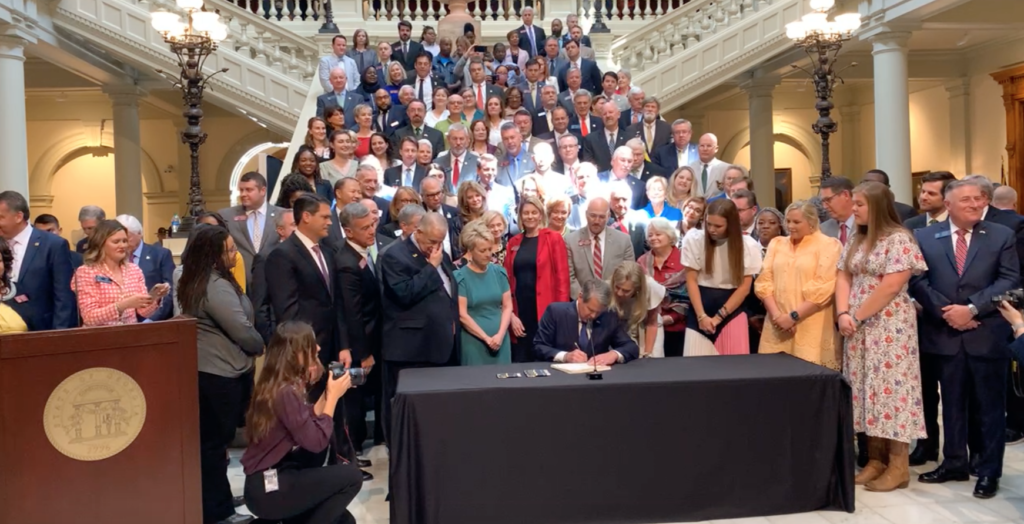ATLANTA (AP) — There may be no rank-and-file Democratic senator with more at stake from the federal government shutdown than Georgia’s Jon Ossoff. He is the party’s only senator who is seeking reelection…
Blog
LEGISLATIVE UPDATE: WEEK 3
The GHF team loves bringing you these weekly legislative updates, and you have told us that you enjoy reading them! Our team works hard to deliver this service to you in a complete and accurate way every week of Georgia’s legislative session. If you rely on these updates to keep you connected to the health happenings under the Gold Dome, please consider supporting our work with a donation today. Thank you very much!

In this week’s update:
- Action Alert: RSVP your spot for Mental Health Parity Day at the Capitol!
- Mental Health bills hitting early
- Other legislation GHF is keeping up with
- The General Assembly 2024 calendar
- Advocacy events for your calendar
- GHF’s got you covered this session!
Action Alert: Secure your spot for Mental Health Parity Day at the Capitol

Join us to continue making mental health parity real in Georgia!
On Thursday, February 8th, join The Carter Center Mental Health Program, GHF, and the Georgia Parity Collaborative for Mental Health Parity Day at the Capitol. This mid-day event will celebrate the passing of the Georgia Mental Health Parity Act (GMHPA) in 2022. This bill addressed the state’s pressing mental health & substance use needs. Immediately following the Mental Health Parity Day program at the Central Presbyterian Church, there will be a press conference in the Capitol South Wing about new efforts to make sure that Georgians feel the full benefits of the law.

Parity means fair or equal. The Georgia Mental Health Parity Act put in place strong rules so Georgians get the mental health & addiction coverage we need (and already pay for). Reserve your spot today and be part of keeping the progress going!
Legislation that GHF is tracking
The first few weeks of Georgia’s legislative session are taken up by some ceremonial activities and a lot of focus on the budget. However, the 2024 session has started with an emphasis on further mental health legislation, stemming from the Mental Health Parity Act of 2022 (HB 1013).

Lowering Prescription Drug Costs for Patients Act
HB 343, introduced by Rep. Mark Newton during the 2023 legislative session, would have changed requirements for pharmacy benefits managers (PBMs). PBMs have come under scrutiny for their role in driving up prescription drug costs. HB 343 would have required PBMs to pass on half of their negotiated savings directly to consumers by lowering the amount a person pays at the pharmacy counter.
The bill was heard by the Senate Health and Human Services Committee last Wednesday where it failed to get the votes to pass out of committee. The bill was supported by numerous consumer advocacy groups, including GHF. It is unlikely that this bill will be revived this session.

Safe at Home Act
Rep. Kasey Carpenter’s HB 404 was approved by the House last year, but didn’t quite make it through the Senate before the end of last year’s session. The bill still sits in the Senate Judiciary Committee and is expected to receive a hearing this week (or soon after).
The bill will provide protections for tenents by ensuring rental properties are fit for human habitation, including cooling as an utility that cannot be shut off prior to an eviction notice, visable eviction notices posted on tenants’ doors, giving tenants three days to pay overdue rent, providing a notice once eviction notice is posted, and prohibiting landlords from requiring a security deposit that exceeds two months’ rent. These protections are necessary to ensure the renter has more housing stability for themselves and their families.
Housing is a basic necessity that is deeply and inextricably tied to a person’s health. In order to live healthy lives, Georgians need stable, affordable housing.

New Juvenile Treatment Court divisions
Sponsored by Rep. Stan Gunter, HB 873, would provide alternative ways of handling juvenile delinquency and truancy cases with the creation of new Juvenile Treatment Court divisions within the juvenile court system.
These new court divisions aim to reduce family disruption or removal to an alternative placement and increase juvenile rehabilitation and treat their mental and behavioral health needs.
HB 873 has been referred to the House Juvenile Justice committee.

The EmPATH Georgia Act
HB 913, sponsored by Rep. Imani Barnes, within the Department of Behavioral Health and Developmental Disabilities (DBHDD) would create emergency psychiatric assessment, treatment and healing (EmPATH) units within Georgia hospitals.
When someone experiencing a “brief, intense crisis” arrives to a hospital they would be given immediate treatment for their situation and brought to a calming area. Other states with this immediate care have shown a reduced boarding costs and unnecessary hospitalizations.
HB 931 has been referred to the House Public Health committee.

Prohibiting discrimination against certain healthcare facilities and providers
Introduced by Rep. Mandi Ballinger, HB 924 will prohibit insurers from discriminating against certain healthcare facilities and providers in connection with the administration of provider administered drugs. Provider administered drugs are medicines that cannot be self-administered by the patient or a caregiver. They are typically infused or injected by a health care provider in a physician’s office, clinic, infusion center, or hospital. Examples include some clotting factors for bleeding disorders and immunosuppresants used by transplant patients, among others.
This bill aims to ensure insurers will not be able to exclude coverage for a provider administered drug if not given out by a pharmacy selected by the health benefit plan. Some physicians purchase these drugs directly from the manufacturer or other source.
HB 924 is scheduled to be heard by the House Insurance Committee this week.

Drug Abuse Treatment and Education Programs
Introduced by Sen. Randy Robertson, SB 331, would provide definitions for certification of recovery residences and more oversight of these facilities – including more background checks on employees and further inspections from DCH. These inspections and trainings would ensure that the facilities aimed at improving Georgians’ mental health and substance use conditions are healthy, safe places for people to seek care.
SB 331 has been referred to the Senate Health and Human committee.
2024 General Assembly Calendar

Georgia’s General Assembly meetings and adjournments for 2024
The General Assembly adopted the full calendar for the rest of the 2024 legislative session. Two important dates to note:
- February 29th – Crossover Day. This is the deadline by which a bill has to be approved by either the Senate or the House so it can “cross over” to the other chamber. If bills do not meet this deadline, they are usually considered “dead” and unavailable for passage.
- March 28th – SINE DIE. “Sine Die” means “no certain date to resume.” At the Georgia legislature, that means it’s the last day of that year’s session.
Advocate with us at the Capitol!

Check out these advocacy events:
Each week during the legislative session, we’ll highlight legislative advocacy days hosted by partner groups. These are great opportunities for you to participate in the lawmaking process by meeting your legislators and speaking up about important health issues. Upcoming:
- February 8: Mental Health Parity Day at the Capitol with The Carter Center Mental Health Program and the Georgia Parity Collaborative
- February 12: Georgia Community Health Worker Awareness Day 2024 with Georgia Watch
- Febrary 26: Medicaid Expansion Advocacy Day with Cover Georgia
- February 28: 2024 Housing Day at the Capitol with Georgia Advancing Communities Together, Inc. (ACT)
If you have an upcoming advocacy event that you’d like included, please contact Alex McDoniel at amcdoniel@healthyfuturega.org.

Stay up-to-date with the legislative session
GHF will be monitoring legislative activity on a number of critical consumer health care topics. Along with our weekly legislative updates and timely analysis of bills, here are tools to help you stay in touch with health policy under the Gold Dome.
- Sign up for the Georgia Health Action Network (GHAN) to receive action alerts that let you know when there are opportunities for advocacy and action
- Remind yourself how the legislative process works
- Catch up with our 2023-2024 policy priorities
- Track health-related legislation on GHF’s website
- Find or contact your legislators on our website
- Write a letter to the editor about a legislative issue that’s important to you
Stay Connected
GHF In The News
Archive
- October 2025
- September 2025
- August 2025
- July 2025
- June 2025
- May 2025
- April 2025
- March 2025
- February 2025
- January 2025
- October 2024
- May 2024
- April 2024
- March 2024
- February 2024
- January 2024
- December 2023
- October 2023
- July 2023
- April 2023
- March 2023
- February 2023
- January 2023
- December 2022
- October 2022
- September 2022
- August 2022
- June 2022
- April 2022
- March 2022
- February 2022
- January 2022
- December 2021
- November 2021
- October 2021
- September 2021
- August 2021
- June 2021
- May 2021
- April 2021
- March 2021
- February 2021
- January 2021
- December 2020
- November 2020
- October 2020
- September 2020
- July 2020
- June 2020
- May 2020
- April 2020
- March 2020
- February 2020
- January 2020
- December 2019
- November 2019
- October 2019
- September 2019
- August 2019
- July 2019
- May 2019
- April 2019
- March 2019
- February 2019
- January 2019
- December 2018
- November 2018
- October 2018
- September 2018
- August 2018
- July 2018
- June 2018
- May 2018
- April 2018
- March 2018
- February 2018
- January 2018
- December 2017
- November 2017
- October 2017
- September 2017
- August 2017
- July 2017
- June 2017
- May 2017
- April 2017
- March 2017
- February 2017
- January 2017
- December 2016
- November 2016
- October 2016
- September 2016
- August 2016
- July 2016
- June 2016
- May 2016
- April 2016
- March 2016
- February 2016
- January 2016
- December 2015
- November 2015
- October 2015
- September 2015
- August 2015
- July 2015
- June 2015
- May 2015
- April 2015
- March 2015
- February 2015
- January 2015
- December 2014
- November 2014
- October 2014
- September 2014
- July 2014
- May 2014
- March 2014
- January 2014
- December 2013
- October 2013
- September 2013
- August 2013
- July 2013
- June 2013
- May 2013
- April 2013
- March 2013
- February 2013
- January 2013
- November 2012
- October 2012
- September 2012
- July 2012
- June 2012
- May 2012
- April 2012
- March 2012
- February 2012
- January 2012
- December 2011
- November 2011
- October 2011
- September 2011
- August 2011
- July 2011
- June 2011
- April 2011
- March 2011
- February 2011
- January 2011
- December 2010
- November 2010
- October 2010
- September 2010
- August 2010
- July 2010
- June 2010
- May 2010
- April 2010
- March 2010
- February 2010
- January 2010
- December 2009
- November 2009
- October 2009